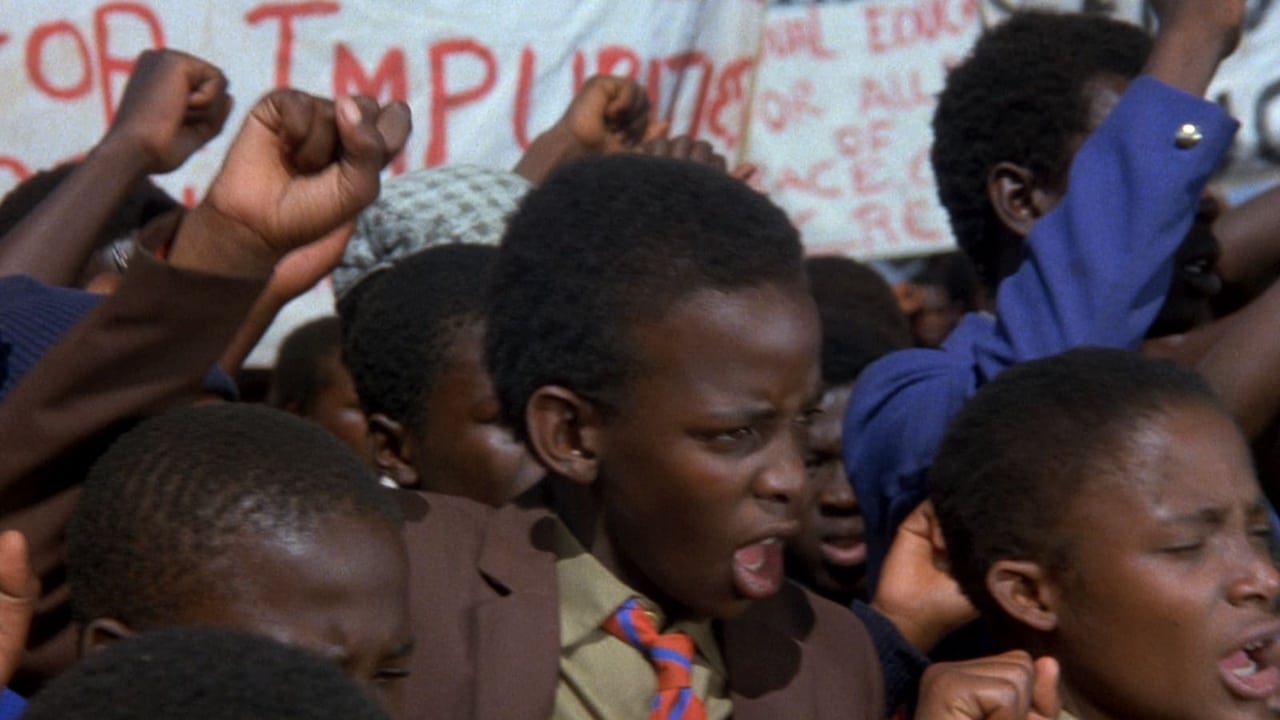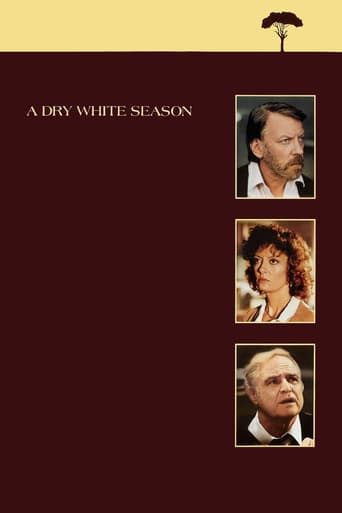

just watch it!
... View MoreExcellent, a Must See
... View MoreThis is a tender, generous movie that likes its characters and presents them as real people, full of flaws and strengths.
... View MoreThis is one of the few movies I've ever seen where the whole audience broke into spontaneous, loud applause a third of the way in.
... View MoreLike "Cry Freedom" and "A World Apart", "A Dry White Season" looks at someone who begins to see the truth of life for black South Africans under apartheid. In this case, it's a teacher (Donald Sutherland) in a whites-only school in 1976. When the son of his gardener gets attacked by the police at a protest, the teacher investigates, drawing the ire of the authorities. There are some pretty gruesome scenes of massacres and torture (and remember, this was in a country that the west claimed was a democracy).One line caught my attention. The teacher's wife (Janet Suzman, niece of anti-apartheid activist Helen Suzman) says of South Africa's black population "Don't you think they'd do the same to us if given the chance?" Crime has persisted since the end of apartheid, and most of the black population is no better off than it was under apartheid. In fact, due to massive privatization as apartheid was ending, much of the country's infrastructure is in a state of disarray. The question is whether one prefers a totalitarian government that provides services or a democratic one that doesn't.Anyway, a good movie. Despite the emphasis on Susan Sarandon and Marlon Brando, they have smaller roles than I expected. Whatever the case, I recommend it.
... View MoreCompelling fictional account of a teacher (Sutherland) who begins to delve into the clandestine methods of his local South African police force when the heavy handedness being meted out against the coloured population happens close to home. Sutherland's character is essentially colour-blind, and shocked to discover his friends, colleagues and even his wife are all afflicted by the stain of Apartheid, and unwilling to modify their views (for fear, retribution and in some cases, their racism).Brando has a relatively peripheral role as the human rights counsel, appearing in a puppet court where vicious establishment official Jurgen Prochnow is on trial for covert, racially-based atrocities. Prochnow is the film's sleeper role as the cold, merciless enforcer, while Ntshona playing Sutherland's key accomplice is also quite a defining character (some may recognise him from "The Wild Geese" in which he played the president in exile Julius Limbani). Susan Sarandon, Michael Gambon, Paul Brooke, John Kani and Ronald Pickup have smaller roles.There's a few unsettling moments and gathering tension in the manner in which Sutherland's character is perversely ostracised for his 'disloyalty', a pariah whose young son makes him vulnerable to retributions. It's a busy kind of movie with frequent scene interchanges, multiple minor characters and sub-plots but the narrative is pervasive and keeps you engaged.
... View MoreA Dry White Season,which was the first major Hollywood studio film with a black, female director,Euzhan Palcy.The movie stars Donald Sutherland, Janet Suzman, Zakes Mokae, Jürgen Prochnow, Susan Sarandon and Marlon Brando,who was nominated for the Academy Award for Best Supporting Actor. It is set in South Africa, and deals with the subject of apartheid.The movie was directed by Palcy with the screenplay co-written by Palcy and Colin Welland with contributions from Robert Bolt.The movie based upon André Brink's novel of the same name. In the story,Sutherland portrays Ben Du Toit, a South African school teacher. The story takes place in 1976, around the Soweto Riots, during the Apartheid system that lasted from 1948 until 1994.The story begins when a gardener at Ben's school, a black man named Gordon, seeks his help while investigating the death of his son during the Riots. Like many South African whites, Ben refuses to get involved in the racial divides that have been tearing the country apart, thinking that Gordon's claims against the white minority government are unfounded. Things change when Ben sees firsthand the brutality by his own race against blacks, particularly when he sees the dead body of Gordon at the morgue not long after being tortured at the hands of the secret, corrupt government police. Gordon's wife, Emily, is also killed later, and also under suspicious circumstances.Upset by this turn of events, Ben retains Ian Mackenzie,a human rights attorney, to assist him with the case. Ben's political awakening is so complete by this time that his crusade to bring those responsible for the deaths of Gordon and his family members eventually take their toll on his own family. Eventually, Ben Du Toit pays the ultimate price for standing up to a corrupt government for basic human rights and equality.The movie is far from great for it was slow and mundane but the provocative topic about the Apartheid System and the political awakenings in South Africa makes up for it.Aside from that,Brando's great performance as a human rights attorney,Ian Mackenzie makes it a film to watch.A Dry White Season is a film recommended for people who love political movies and fans of Marlon Brando,who came back in a strong performance devoid of salary after 9 years of absence in making movies in total support of the Euzchan Palcy's film.
... View MoreVery compelling. I have never been to South Africa myself, but I have met several young South African Jews who were enrolled in a hebrew school.I wonder what they would have thought of this, not being completely part of the white race in South Africa. I met them right after the more moderate Le Klerk had stepped down from office and there was to be held an election.I can remember, the young people being very divided about who to vote for. There were some of them who definitely would have voted for ANC, Nelson Mandela's party, but still, there were some who thought of Mandela as too radical and chose to vote for the moderate white party. Can't think of the name of it right now.That to me is the essence of this movie. Those not in power, have tremendous fear of those in power. Look at the white people in this movie. Oh, sure. You could argue, that they are a bunch of racists who sit in their white castles looking down on the inferior blacks, which they consider savages. That is especially embedded in the character of Du Toit's wife. She doesn't know how to break free of her prejudice and still she has qualms about the government. She just doesn't have the courage to stand up to them because she knows that if she does, nothing will be the same again.It's a shame that the movie doesn't really focus that much on her but instead on the more heroic Du Toit and his even more heroic son. That's unfortunately one of the more unbelievable parts of the story: The heroic son. We know that Du Toit has lead a sheltered life, but when his son is exposed to the ugliness, he seems to get what the theme of the movie is right away. If you were a kid his age, wouldn't you question what had happened a little bit? Apart from that, this is a very well made, thoughtprovoking and kind of ambitious project. Marlon Brando shows up in one of his most brilliant performances. I recently saw his '94 interview on Larry King through the magic of YouTube. I was surprised of seeing him so coherent. He actually had a point that was not clouded in his own misperceptions. Sure, he still had a rather weak argument about show business but his other points came through brilliantly. Too bad, Larry King was more concerned about the commercial breaks. On second thought, that illustrated Brando's point on the business end of show business, so I guess he was really making a valid point. Sorry, Brando. May you rest in peace.Back to the movie for one second. I was a little surprised of seeing Susan Sarandon in such a non-descript part. It's like she turns up, has a few conversations and then disappears. Her is integral in the plot, but I wish her character had been a little more developed.Otherwise, I recommend that everybody see this. The theme is the most important one we not only faced back then but which is still current today. Fear can generate hate and ignorance and lead to segregation, not just of races.
... View More